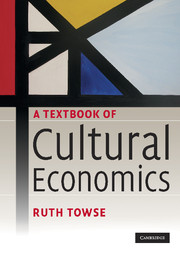Book contents
- Frontmatter
- Contents
- List of figures
- List of tables
- List of boxes
- List of abbreviations
- Preface
- Part I General issues in cultural economics
- Introduction
- 1 Introduction to cultural economics
- 2 Economic profile of the cultural sector
- 3 Markets for cultural goods and services
- 4 Economic organisation of the creative industries
- 5 Production, costs and supply of cultural goods
- 6 Consumption of cultural goods and services
- 7 Welfare economics and public finance
- Part II The ‘traditional’ economics of the arts and heritage
- Part III Artists' labour markets and copyright
- Part IV The creative industries
- Part V Conclusion and exercises and problems
- References
- Index
7 - Welfare economics and public finance
- Frontmatter
- Contents
- List of figures
- List of tables
- List of boxes
- List of abbreviations
- Preface
- Part I General issues in cultural economics
- Introduction
- 1 Introduction to cultural economics
- 2 Economic profile of the cultural sector
- 3 Markets for cultural goods and services
- 4 Economic organisation of the creative industries
- 5 Production, costs and supply of cultural goods
- 6 Consumption of cultural goods and services
- 7 Welfare economics and public finance
- Part II The ‘traditional’ economics of the arts and heritage
- Part III Artists' labour markets and copyright
- Part IV The creative industries
- Part V Conclusion and exercises and problems
- References
- Index
Summary
Welfare economics has been referred to in several places earlier in the book, and in this chapter its general principles are explained in the context of the economic rationale for government intervention in the cultural sector. The application of welfare economics to cost–benefit analysis and to economic impact studies is outlined and its use in cultural economics illustrated. The second part of the chapter then turns to the application of the principles of public finance to the arts and heritage and an analysis of the way subsidy works at the level of the individual arts organisation. The material in this chapter draws on the theories of production and of consumer behaviour in chapters 5 and 6; while they focused on the decision-making of individuals in the market, welfare economics and public finance examine societal decision-making. Chapter 2 introduced some of the basic points about cultural policy, and these are developed further here. The chapter therefore provides the theoretical basis for the evaluation of cultural policy that is presented in chapter 10.
Some clarification is needed about the use of terms: although cultural policy and government spending vary a great deal as to how centralised or devolved they are in different countries, this chapter ignores these differences and concentrates on general principles; therefore, the words ‘government’ and ‘state’ are used in a general way meaning any level of public administration, and the term ‘public finance’ applies to any level of taxation and public expenditure.
- Type
- Chapter
- Information
- A Textbook of Cultural Economics , pp. 161 - 194Publisher: Cambridge University PressPrint publication year: 2010



